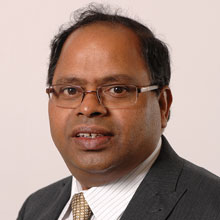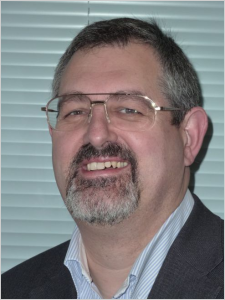Peter Sloot, Complexity Institute Singapore, Singapore; ITMO St. Petersburg, Russian Federation; University of Amsterdam, Netherlands
Title: Complexity Science with the Internet of Things
Verena Kantere, University of Geneva, Switzerland
Title: The New Era of Multi-Dimensional Data Management
Muthu Ramachandran, Leeds Beckett University, United Kingdom and
Gary Willis, University of Southampton, United Kingdom
Title:
Latest trends, frameworks and examples in Information Systems, Big Data and Cloud Computing
Schahram Dustdar, Vienna University of Technology, Austria
Title:
Towards building cyber-physical ecosystems of People, Processes, and Things
Complexity Science with the Internet of Things

|
Peter Sloot
Complexity Institute Singapore, Singapore; ITMO St. Petersburg, Russian Federation; University of Amsterdam
Netherlands
|
Brief Bio
Peter Sloot is distinguished research professor at the University of Amsterdam and a full professor and director of the Complexity Institute in NTU, Singapore. He is a Leading Scientist Laureate and has been the PI of many international research programs on complex biomedical systems, like www.virolab.org and www.dynanets.org. He is editor in chief of two highly ranked Elsevier Science journals. He has published over 400 research papers. His work is covered in international media such as newspapers, interviews and documentaries. See: http://staff.science.uva.nl/~sloot/
Abstract
We have covered the planet with sensors, cameras, microphones, drones, tracking devices, you name it. All that data is coming at us with an incredible diversity, volume and speed. It is the goal of the Internet of Things (IoT) to provide an infrastructure that can deal with this paradigm shift in ICT.
Business and industry have already discovered the huge potential the IoT will provide them with. Up to now however the scientific world seems to wait and see.
In this talk I will explore the new science we can expect from using the IoT as an experimental platform to study truly complex systems. The need for that is urgent and knocking at our door: We live in a complex world and are surrounded by complex systems: from a biological cell, made of thousands of different molecules that seamlessly work together, to millions of computer systems that should work together, to our society, a collection of seven billion individuals that try to work and live together. These complex systems display endless signatures of order, disorder, self-organization and self-annihilation.Understanding, quantifying and handling this complexity is one of the biggest scientific challenges of our time. I will discuss ways in which the IoT can help us to make sense of the world around us, to analyze, predict and nudge control its amazing complexity.
The New Era of Multi-Dimensional Data Management

|
Verena Kantere
University of Geneva
Switzerland
|
Brief Bio
Verena Kantere is a Maître d' Enseignement et de Recherche - Senior Lecturer at the Centre of Informatics (CUI) at the University of Geneva. Before she was a Senior Researcher and the Excellence Grant Holder at CUI, University of Geneva (UniGe) working towards the provision and exchange of data services in cloud environments, focusing on the management of Big Data and performance of Big Data analytics, by developing methods, algorithms and fully fledged systems. Before coming to the UniGe she was a tenure-track junior assistant professor at the Department of Electrical Engineering and Information Technology at the Cyprus University of Technology (CUT). She has received a Diploma and a Ph.D. from the National Technical University of Athens, (NTUA) and a M.Sc. from the Department of Computer Science at the University of Toronto (UofT), where she also started her PhD studies. After the completion of her PhD studies she worked as a postdoctoral researcher at the Ecole Polytechnique Federale de Lausanne (EPFL). During her graduate studies she developed methods, algorithms and fully fledged systems for data exchange and coordination in Peer-to-Peer (P2P) overlays with structured and unstructured data, focusing on the solution of problems of data heterogeneity, query processing and rewriting, multi-dimensionality and management of continuous queries. Furthermore, she has shown interest and work in the field of the Semantic Web, concerning the problem of semantic similarity, annotation, clustering and integration.
Abstract
Ubiquitous computing and modern data collection tools have given rise to a new era of data management, in which the data as well as the processing environments are enormous and diverse. In this era in which the terms Big Data and Cloud Computing prevail, the success of data management relies in optimizing data processing on multiple dimensions and delivering data services with multifarious quality guarantees. In this talk we will discuss the challenges and the opportunities of the new era of data management and we will explore the possibilities and limitations of multi-dimensional data management. We will focus more on the incorporation of the notion of cost in traditional and new techniques and the role of data heterogeneity.
The talk will summarize recent work on a novel economy model for a cloud where users pay on-the-go for the data services they receive and user payments can be used for service provision, infrastructure maintenance and profit. The discussion will go further to the requirement of approximately querying big heterogeneous data in such an environment.
The talk will conclude with a discussion on the special management requirements of big analytical data collections and how these could be fulfilled employing cloud data services.
Latest trends, frameworks and examples in Information Systems, Big Data and Cloud Computing

|
Muthu Ramachandran
Leeds Beckett University
United Kingdom
|
Brief Bio
Muthu Ramachandran is a Principal Lecturer at Leeds Beckett University. He has extensive research coupled with teaching background and experiences on software and systems engineering methods & lifecycle and is an expert in SOA, Cloud and security. He is an author of two books, an edited co-author of a book, and has also widely authored published journal articles, book chapters and conferences materials on various advanced topics in software engineering and education. He is a member of various professional organizations and computer societies. He was also invited speaker on 5th International symposium on SOA Cloud 2012, London.

|
Gary Wills
University of Southampton
United Kingdom
|
Brief Bio
Dr. Gary Wills is an Associate Professor in Computer Science at the University of Southampton. He graduated from the University of Southampton with an Honours degree in Electromechanical Engineering, and then a PhD in Industrial Hypermedia systems. He is a Chartered Engineer, a member of the Institute of Engineering Technology and a Principal Fellow of the Higher Educational Academy. He is also an adjunct professor at the Cape Peninsular University of Technology and a research professor at RLabs. Gary's research projects focus on System Engineering and applications for industry, medicine and education, see research pages for more information. He has several students working in related areas to Enterprise Security.
Abstract
Managing complexity has been the key research issue for several decades in information systems research. However, there is a lack of systematic and structured approaches to adopting and modelling information systems. This is in addition to lack of consideration given for social factors and modelling and designing large scale information systems. This talk will provide insights into complexity in current information systems and technologies. This talk will provide examples of complexity in cloud security, big data security, large scale information systems and service computing.
Towards building cyber-physical ecosystems of People, Processes, and Things

|
Schahram Dustdar
Vienna University of Technology
Austria
|
Brief Bio
Schahram Dustdar is Full Professor of Computer Science and head of the Distributed Systems Group at the TU Vienna. From 2004-2010 he was Honorary Professor of Information Systems at the Department of Computing Science at the University of Groningen (RuG), The Netherlands. He is an Associate Editor of IEEE Transactions on Services Computing, ACM Transactions on the Web, and ACM Transactions on Internet Technology and on the editorial board of IEEE Internet Computing and IEEE Computer. He is the Editor-in-Chief of Computing (Springer). Dustdar is recipient of the ACM Distinguished Scientist award (2009), the IBM Faculty Award (2012), a member of the Academia Europaea: The Academy of Europe, and an IEEE Fellow (2016).
Abstract
Emerging elastic systems made of People, Processes, and Things span whole business processes, sometimes event across organizations. They capture, manage, and adapt to the needs of all involved actors. However, elasticity brings challenges in the design and management of software, the involved human organizations, and busi- ness processes. In this talk we analyze today's challenges in combining People, Processes, and Things to build elastic systems.